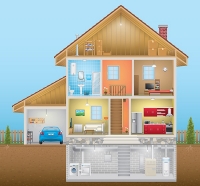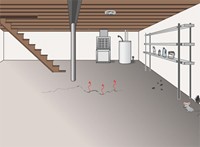Healthy Homes - Basement
Health and safety tips
- Test your home for radon.
- Keep the basement dry.
- Have a trained professional inspect, clean, and tune up central heating system (furnaces, flues, and chimneys) annually. Repair any leaks promptly.
- Vent clothes dryers, gas heaters and other appliances to the outdoors.
- Maintain smoke and carbon monoxide alarms.
- Store pesticides and chemicals out of reach of children.
- Seal holes and gaps in floors and walls.
- Clean up clutter.
- Prevent falls by installing stair hand rails. Keep stairs well-lit.
- Keep cleaning supplies out of reach of children.
Green tips
- Select energy-efficient products when you buy new heating and cooling equipment.
- Insulate your water heater and turn down the thermostat to 120ºF.
Controlling a damp basement
Basements are often used as extensions of indoor living space or for storage. Moisture levels in the basement or crawl space should be maintained like other parts of the home. If your basement air feels damp, measure the humidity. If the humidity is often above 50 percent relative humidity, you probably need to reduce moisture. Consider using a dehumidifier. If water collects on your basement floor or seeps through the basement walls, you probably need to do some home maintenance. Basement floors and walls can be sealed to prevent moisture. Keep rainwater away from basement and foundation walls. To keep water away from your home, you might need to slope landscaping, bury a French drain, or install a sump pump.
Pesticide Safety
Before using any pesticide, read the pesticide label and become familiar with all precautions, including first aid instructions. Be sure to only use pesticides designed for indoor use. Do not use pesticides inside the home made for outdoor use. For more information on using and storing pesticides safely read over EPA’s Pesticide Safety information.
How do I properly dispose of household hazardous waste?
The Tennessee Department of Environment and Conservation conducts mobile household hazardous waste collection events throughout Tennessee each year. Any Tennessee citizen can participate in the mobile household hazardous waste collection service. Check the collection schedule to determine a convenient event for you.
Only household hazardous wastes are accepted for proper disposal. No commercial, institutional or agri-business waste will be accepted. The day of the event, load the unwanted materials into your trunk or the back of your truck. For safety, don't mix materials, keep them in their original containers, double package any leaking containers, and place any breakable containers in a box, cushioned with newspaper. When you get to the event you will be asked what county you live in and where you learned about the event.
Clothes dryer Safety Tips
The National Fire Protection Association (NFPA) states the leading cause of home clothes dryer fires is failure to clean them. They provide these dryer safety tips:
- Have your dryer installed and serviced by a professional.
- Do not use the dryer without a lint filter.
- Make sure you clean the lint filter before or after each load of laundry. Remove lint that has collected around the drum.
- Rigid or flexible metal venting material should be used to sustain proper air flow and drying time.
- Make sure the air exhaust vent pipe is not restricted and the outdoor vent flap will open when the dryer is operating. Once a year, or more often if you notice that it is taking longer than normal for your clothes to dry, clean lint out of the vent pipe or have a dryer lint removal service do it for you.
- Keep dryers in good working order. Gas dryers should be inspected by a professional to make sure that the gas line and connection are intact and free of leaks.
- Make sure the right plug and outlet are used and that the machine is connected properly.
- Follow the manufacturer’s operating instructions and don’t overload your dryer.
- Turn the dryer off if you leave home or when you go to bed.

Additional resources
U.S. Environmental Protection Agency (EPA)
A Citizen’s Guide to Radon
www.epa.gov/sites/default/files/2016-12/documents/2016_a_citizens_guide_to_radon.pdf
Centers for Disease Control and Prevention (CDC)
Carbon Monoxide Poisoning
www.cdc.gov/co/faqs.htm
Fire Death and Injury Prevention
www.cdc.gov/HomeandRecreationalSafety/Fire-Prevention/fireprevention.htm
Burns Safety
www.cdc.gov/safechild/burns/index.html
Safety from Falls
www.cdc.gov/HomeandRecreationalSafety/Falls/adultfalls.html
Tips to Prevent Poisoning
www.cdc.gov/HomeandRecreationalSafety/Poisoning/preventiontips.htm
U.S. Department of Housing and Urban Development (HUD)
Help Yourself to a Healthy Home
www.hud.gov/sites/documents/DOC_11880.PDF
U.S. Department of Energy (DOE)
Energy Savers
www.energy.gov/energysaver/energy-saver-guide-tips-saving-money-and-energy-home
Tennessee Department of Environment and Conservation (TDEC)
Tennessee Radon Program
www.tn.gov/environment/program-areas/opsp-policy-and-sustainable-practices/community-programs-and-services/radon.html
